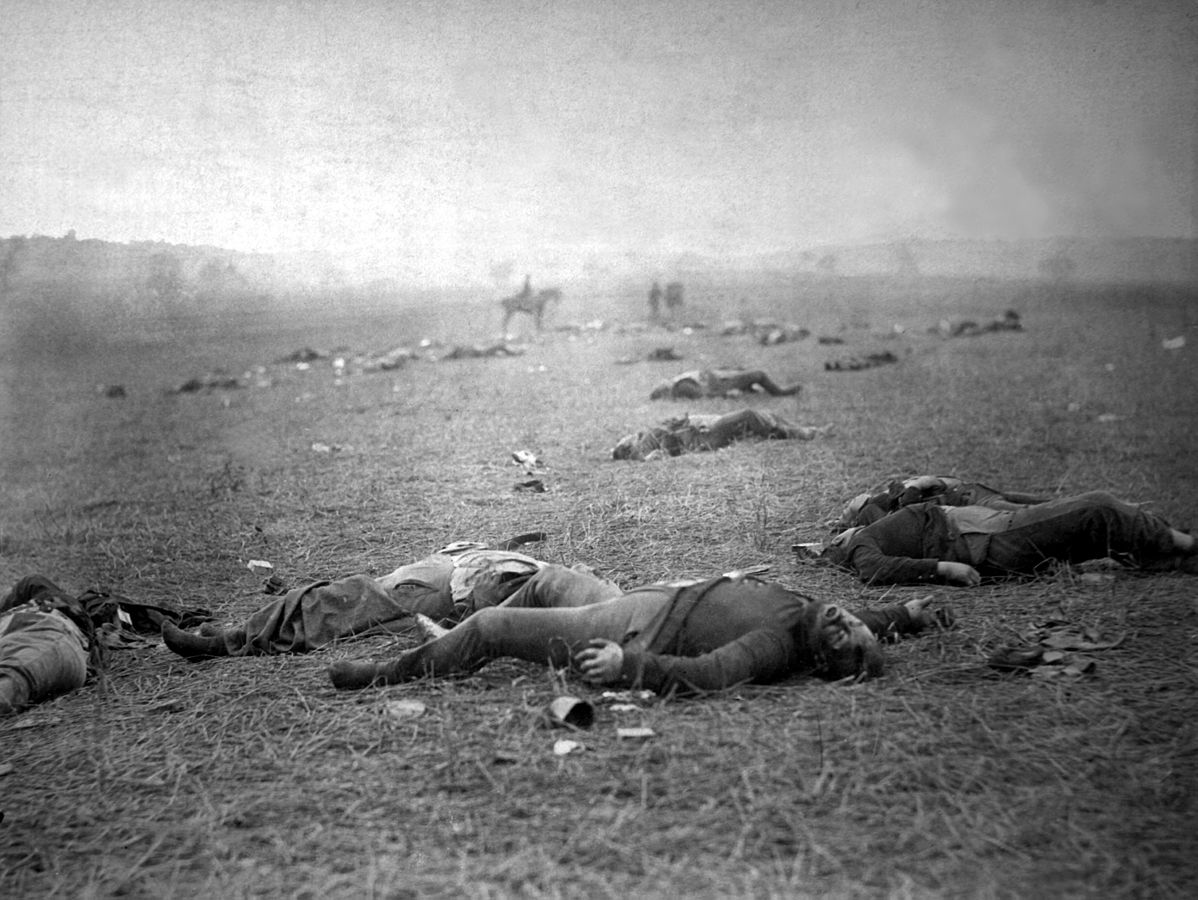How Probable Is A Second American Civil War?
Union dead on the battlefield at Gettysburg, Pennsylvania, photographed July 5 or July 6, 1863, by Timothy H. O’Sullivan
Wikimedia Commons / T. H. O’Sullivan
Essays speculating on the imminent beginning of a second American civil war are proliferating with the rising political violence by American Leftists and the recent assassination attempts on Republican lawmakers. All you have to do to find them is to do a Google search with the search phrase, “second american civil war 2017.” Could these posts be just hysterical overreaction, or is there a real possibility for such a catastrophe?
Rational Fears For Widespread Civil Conflict
Alas, there are very real reasons to believe we are about to descend into such a hell. And Hell it would be. To emphasize the accuracy of this assertion is the reason for my choice of this post’s theme image: A photo of Union dead on the Gettysburg battlefield in July 1863. As any combat soldier could tell you, war is nothing but total misery and pain. With fellow citizens killing each other — people who should be brothers and sisters — civil war would be a very special kind of Hell.
It has been 152 years since the last shot was fired in the first American civil war, and we have survived all that time since without hating each other enough to start killing each other in large numbers over political controversies. We might have come close to doing so in the 1960s and 1970s over the war in Vietnam, but somehow we avoided it then. If Vietnam did not push us over the brink, why should we believe we would be so stupid as to start such an insanity now?
The reasons to believe we would do it start with realizing how much Americans of different ideological persuasions have come to hate each other. Over the years, the political movements of progressivism and neoliberalism (aka “conservatism”) have replaced Christianity and Judaism as the major American religions for many. Our current baleful situation is exactly analogous to the European wars of religion between 1524 and 1648. As al-Qaeda and ISIS have most recently reminded us, religion can on occasion provide extremely strong motivations to kill the infidel.
Do Americans really despise each other so much over their different beliefs? What is the evidence? The Pew Research Center has been keeping track of how Democrats and Republicans view each other for some time now, and as their plot below demonstrates, American partisans are liking each other less and less.

Pew Research Center
As of April 2016, majorities in both major parties for the first time viewed the policies of the other party not just unfavorably, but very unfavorably. What exactly this means can be seen in the Pew Research bar charts below. In them, the responses in April 2016 are displayed both for all partisans of both parties and for those partisans with high political engagement.

Pew Research Center
First, note how similar the numbers are for each party. In both parties strong majorities among the politically committed are frightened by, angry with, and frustrated by the policies and views of the other party. Fear and anger fused together equals hate.
As I have noted before, the source of all this hate can only come from the different views of reality held by people, opinions about what reality allows and does not allow, and about what causes our major problems and what is irrelevant. Progressives believe in government and want a great deal more of it; neoliberals, while recognizing government is needed to enforce the social contract, do not see the usefulness of much of government and want a great deal less of it. Progressives see government as the savior of the people; neoliberals see it as an oppressor and the source of many of our most serious problems.
Until the two sides can begin to agree on fundamentals about which they now profoundly disagree, our descent into civil war can only continue.
How Can We Escape This Disaster?
In any war with two belligerents, only one of the two sides is needed to decide the war will be waged. If the other side would prefer not to go to war, nevertheless it must do so if it desires to continue to exist. If one belligerent decides on civil war within a democratic republic, then democracy has failed since that side has decided it can not allow elections to thwart their will.
Unfortunately, the convictions of progressive Democrats on the desirability of democracy have steadily weakened ever since the administration of Woodrow Wilson, almost exactly a century ago. They have demonstrated an historical amnesia about why limited, democratic government with divided powers is so essential for our continuing freedoms and well-being. Instead, they have insisted on centralizing increasing amounts of power, particularly economic power, in the government. This path they are following is Friedrich Hayek’s Road to Serfdom, at the end of which is totalitarian fascist government.
If progressives decide their programs and policies are more vital than respecting elections, that it would be better to overthrow Trump than to respect the decisions of the electorate, how can the slide to civil war be halted? Our only salvation from civil war exists in each side being tolerant of the views of the other, at least tolerant enough to respect the results of elections. Nevertheless, given their historical authoritarian proclivities, I find it hard to believe Democrats will stop their progress along the Road to Serfdom. I also find it hard to believe they can reach their goal without sparking a civil war with those of us who will violently disagree with the destination of progressive, fascist government.
Views: 3,292






























